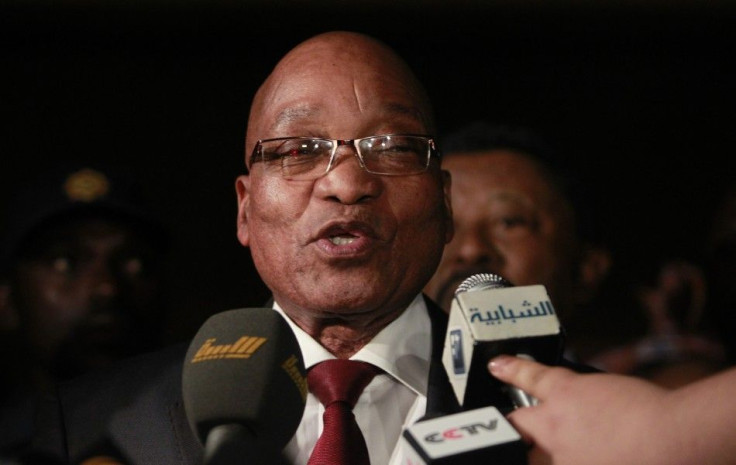S.Africa's Zuma asks for new probe of arms deal

South African President Jacob Zuma will appoint a commission to investigate a multi-billion dollar arms deal, his office said on Thursday, in a new probe into corruption allegations against several companies and top officials including Zuma himself.
The 30 billion rand deal to buy European military equipment from about a decade ago has clouded South Africa's politics for years. It has led to a few convictions of officials who took bribes to help land contracts but critics said probes did not go far enough, letting several others off the hook.
Zuma -- then deputy president -- was linked to the deal through his former financial adviser, who was jailed for corruption. This almost torpedoed Zuma's bid for high office but all charges against Zuma were dropped in 2009.
The president will soon announce the terms of reference and the composition of the commission including the time frames, Zuma's office said in a statement.
The presidency did not say what impact its investigative commission would have on a probe into the same charges announced earlier by South Africa's special police unit known as the Hawks.
But analysts said Zuma might by trying to deflect attention from the other investigation.
It might well be an attempt to head off some other investigation. There doesn't seem to be any other rational explanation given the lateness of the hour, said Gary van Staden, a political analyst with NKC Independent Economists.
Any investigation is likely pile pressure on Zuma who is facing a leadership crisis in his ruling African National Congress that may deter his chances at a second term. But a panel appointed by his office could help Zuma dictate the terms of the probe.
The timing of the announcement is interesting, said Helen Zille, leader of the main opposition Democratic Alliance.
After all these years, the South African public deserve to finally know the whole truth behind the arms deal. The cancer of corruption is destroying the body politic of South Africa with the arms deal at its core, she said.
Despite calls to crush corruption from labour federation COSATU and South Africa's Communist Party -- in a governing alliance with the ruling African National Congress -- Zuma has done little to address a problem that has eroded confidence in the government ruling the continent's top economy.
South Africa spent about billions in the late 1990s to modernise its military, with investigators probing several of the contracts on suspicion of bribes being paid to land the deals.
Zuma's former financial adviser Schabir Shaik was convicted in 2005 of trying to solicit a 500,000 rand a year bribe from French arms company Thint in return for protecting it from an investigation.
Hawks officials said in a letter obtained by Reuters last month they planned to send a delegation to Europe to probe whether Swedish defence group Saab and former partner BAE Systems made payments worth millions of rand to a South African consultant to secure a contract.
Saab said in a statement in late July: Our review revealed that approximately 24 million rand was paid from BAE Systems ... These payments were transferred to the South African consultant shortly thereafter.
The companies said they had paid for a consultant in South Africa but denied any wrongdoing.
© Copyright Thomson Reuters {{Year}}. All rights reserved.





















